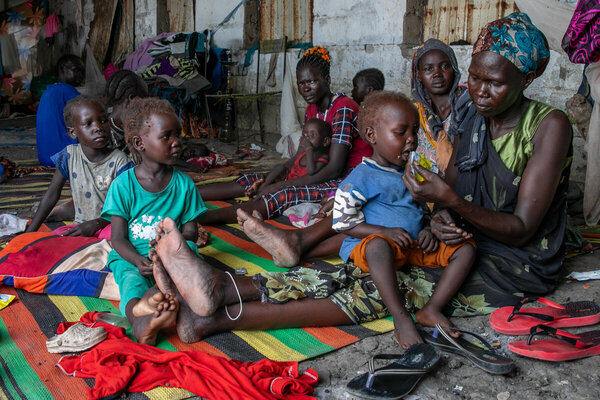Climate crisis drives malnutrition in South Sudan to unprecedented levels in flood-affected areas, WFP warns
Rubkona, a county where floodwaters have permanently submerged entire communities or trapped them on small islands since 2021, is at the very frontline of the flooding and projected to face exceptionally high levels and severity of malnutrition by April 2024.
Data from the Integrated Food Security Phase Classification (IPC) shows more than 1.6 million children under five years of age are expected to suffer from malnutrition in 2024. Flood-affected areas are facing the worst malnutrition due to the spread of water borne diseases and crowded conditions, aggravated by limited access to food and livelihoods.
“This is the reality of living on the frontline of the climate crisis,” warned Mary-Ellen McGroarty, WFP Representative to South Sudan. “We’re seeing an extremely concerning rise in malnutrition which is a direct result of living in overcrowded and waterlogged conditions. The spread of waterborne diseases unravels any work humanitarian agencies do in preventing and treating malnutrition and it is young children who are suffering the impact most severely.”
Rubkona is predicted to be in IPC Acute Malnutrition Phase 5 by April 2024, for the first time ever. This is the highest possible level and reflects the flood crisis that has submerged the entire county for the past two years, alongside severe economic shocks that have seen the cost of staple foods rise by more than 120 percent since April. The flooding is driven by outflows from Nile River basins, particularly Lake Victoria which received above average rainfall in 2023 - meaning there is no relief from the floodwaters in sight.
The Integrated Food Security Phase Classification (IPC) is a comprehensive food security and nutrition analysis. The IPC shows more than seven million people will be facing acute food insecurity through the 2024 lean season with the number of people facing catastrophic hunger (IPC5) expected to rise to 79,000 by April. This increase is largely due to South Sudanese returnees fleeing fighting in Sudan, as they will face increasingly extreme levels of food insecurity. WFP is grappling with significant funding constraints and the resourcing outlook for 2024 remains grim, it’s expected only one-third of the moderately malnourished children in need of treatment will be reached due to shortage of funds.
# # #
Full IPC report available here
Photos available here. For more photos and video please contact gemma.snowdon@wfp.org)
The United Nations World Food Programme is the world’s largest humanitarian organization saving lives in emergencies and using food assistance to build a pathway to peace, stability and prosperity for people recovering from conflict, disasters and the impact of climate change.
Follow us on Twitter @wfp_media @wfp_SouthSudan



